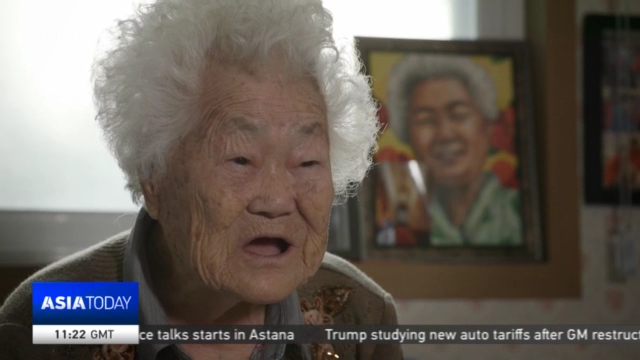
19:47, 29-Nov-2018
Wartime Sex Slavery: South Korea scraps compensation part of controversial 2015 deal
Updated
19:43, 02-Dec-2018
03:25

Meanwhile, South Korea is currently reversing some moves made to get past the issue of wartime sex slaves. The country is getting rid of a Japan-funded foundation set up to financially compensate victims. The foundation began under a controversial deal the two countries struck in 2015. Seoul's plan has provoked an angry response from Tokyo. CGTN's Jack Barton caught up with some former so-called "comfort women" as well as community groups that support them, to ask what they think of the government's latest move.
A care center, that is home to seven of the 27 surviving South Korean women forced into sexual slavery by Japan during World War Two. Women like Yi Ok-seon, who says she was dragged from her workplace aged 15 by two Japanese police, then sent to China where she was forced to work in a Japanese military brothel. Yi was a fierce opponent of the compensation sent by Japan as part of a deal struck with South Korea in 2015.
YI OK-SEON SOUTH KOREAN WARTIME SEX SLAVE "Japan brought the money to Korea to reach an agreement. That money was to give to us grandmothers to shut our mouths up. That's wrong. I felt good when they got rid of the foundation."
Scrapping the compensation aspect of the deal was not the only part of the agreement to break down. One of Japan's key complaints was this comfort women statue outside its embassy in Seoul.
JACK BARTON SEOUL "Under the compensation deal this comfort women statue was supposed to have been removed. Instead, it remained and about 50 more were placed across South Korea, a move that so angered Japan that last year it temporarily withdrew its ambassador."
There is always someone nearby to keep watch, and protests every Wednesday, demanding the entire 2015 deal be torn up.
KIM SUN-KYUNG STUDENT "Because the agreement between Korea and Japan has not been scrapped, we started protesting to insist it be abolished. So we help the grandmothers by protesting here, until the agreement is scrapped."
As part of the deal Japan did offer a statement of "apology and remorse" as well as compensation, to be distributed through the now defunct foundation. But the director of this centre dedicated to wartime sex slaves says former comfort women were not consulted in the lead up to the agreement, which they believe avoided explicit responsibility and was meant to silence the issue as much as settle it.
AHN SHIN-KWON DIRECTOR, HOUSE OF SHARING "Despite the war crimes, human rights abuses, and women being used as tools of war, the agreement did not include education for the current generation and future generations. Rather, they tried to hide the victims' problems forever."
Ahn Shin-kwon says the issue can be settled if a more human approach is taken that fully acknowledges historical wrongs and seeks genuine reconciliation. Time is running out though for these women, and no diplomacy could fully erase the pain they've carried since they were young girls. Jack Barton, CGTN, Seoul.

SITEMAP
Copyright © 2018 CGTN. Beijing ICP prepared NO.16065310-3
Copyright © 2018 CGTN. Beijing ICP prepared NO.16065310-3